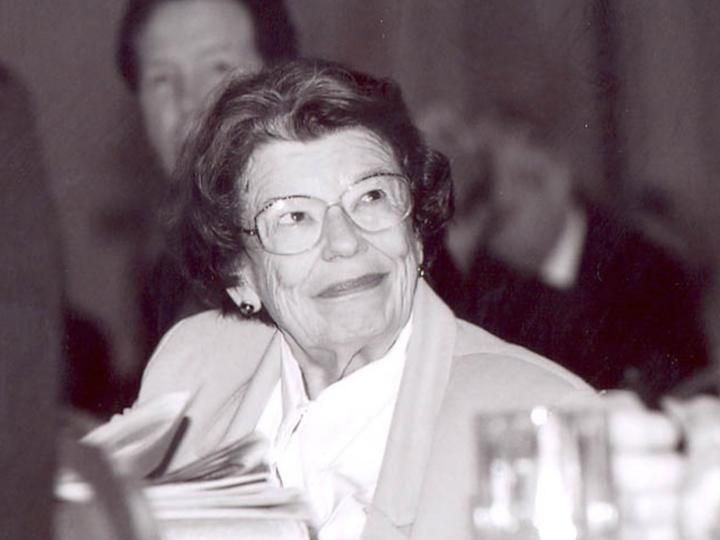Ellen Ash Peters, the first woman appointed to the Connecticut Supreme Court, has died at age 94. A member of ALI for over 50 years, she was elected to the Institute in 1972 and to ALI Council in 1984, taking emeritus status in 2011.Her contributions to the Institute include serving as an Adviser for the Restatement Second of Contracts and Restatement Third of Restitution and Unjust Enrichment.
A commercial law expert, Peters played an integral role in the continued updating of the Uniform Commercial Code, a joint project between ALI and the Uniform Law Commission, including serving as a member of UCC Article 2 revisions and in the Members Consultative Group for Amendments to UCC Payment Articles. She also was selected as an ALI delegate on the first ad hoc committee permitted to attend ULC Annual Meetings to provide informed input of the Institute’s views into the revisions of the Uniform Commercial Code at an earlier stage in the drafting process, a practice that continues today.
Peters was born in Berlin, Germany in 1930. Her family fled the Nazi regime when she was eight years old, immigrating to New York City. She went on to graduate from Swarthmore College in 1951 and from Yale Law School in 1954. In 1956, she became Yale Law School’s first female faculty member at 26 years old. She received tenure in 1964 and became the Southmayd Professor of Law in 1975. Peters would continue to teach as an adjunct professor until her appointment as chief justice of the Connecticut Supreme Court.
Appointed in 1978 to the Connecticut Supreme Court, Peters became the court’s first female chief justice in 1984. Of her more than 600 opinions, she is well known for her majority opinion in the case of Sheff v. O’Neill, which upheld equal educational opportunities for children of Hartford, Connecticut. She served on the court until 1996.
Peters received numerous awards throughout her lifetime; she was the first recipient of the Ella T. Grasso Distinguished Service Medal, the Judiciary Award of the Connecticut Trial Lawyers’ Association, the Yale Law School Distinguished Service Medal, and the Hartford College for Women Pioneer Woman Award. She was inducted into the Connecticut Women’s Hall of Fame in 1994.
Below is an excerpt from her Yale Law School obituary:
“I think a fair number of my colleagues expected me to teach for a few years and then disappear and have babies. I’m not sure when I knew that was nonsense,” Peters told the Hartford Courant in 1978.
At the Law School, Peters taught contracts and commercial law. She was the first woman to gain full professorship in 1964 and was named Southmayd Professor of Law in 1975. She held that position until 1978, when Connecticut Gov. Ella T. Grasso appointed her to the Connecticut Supreme Court.
Peters continued to teach at Yale Law as an adjunct professor until she was appointed Chief Justice on the Connecticut Supreme Court in 1984 by Gov. William A. O’Neill, a role she retained until 1996, when she took senior status.
As Chief Justice, Peters famously ruled to uphold equal educational opportunities for Hartford children in the case of Sheff v. O’Neill.
“The public elementary and high school students in Hartford suffer daily from the devastating effects that racial and ethnic isolation, as well as poverty, have had on their education. Federal constitutional law provides no remedy for their plight,” Peters wrote in her decision. “The principal issue in this appeal is whether, under the unique provisions of our state constitution, the state, which already plays an active role in managing public schools, must take further measures to relieve the severe handicaps that burden these children's education.”
The landmark decision resulted in the establishment of nearly 40 interdistrict magnet schools and an Open Choice program that allows Hartford students to attend suburban schools.
Peters left the court upon mandatory retirement in 2000, although she continued to serve as a judge trial referee on the Connecticut Appellate Court until 2014. During her 18 years on the Supreme Court, she authored more than 600 opinions.
Justice Ruth Bader Ginsburg once said of Peters, “She gave generations of women law students cause for hope [and] a reason to believe that they, too, could aspire and achieve.”
Over the course of her career, she earned many accolades and honors, including the Yale Law School Association’s Award of Merit in 1983 and an honorary Doctor of Laws degree from Yale in 1985. She was the first recipient of the Ella T. Grasso Distinguished Service Medal and received the Connecticut Trial Lawyers’ Association Judiciary Award, the Connecticut Region of Hadassah Myrtle Wreath Award, the Hartford College for Women Pioneer Woman Award, and the National Center for State Courts’ Warren E. Burger Award.?
She received honorary degrees from Yale University, the University of Connecticut, Swarthmore College, the University of Hartford, Georgetown University, New York Law School, Connecticut College, Bates College, Trinity College, Wesleyan University, and the University of Detroit Mercy School of Law. On March 18, 2015 — Peters’ birthday — Gov. Dannel Malloy named March 21, 2015, “Ellen Ash Peters Day” in the state of Connecticut.?
